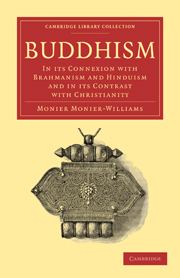Book contents
- Frontmatter
- Preface
- Postscript on the common error in regard to the comparative prevalence of Buddhism in the world
- Contents
- List of Illustrations
- Rules for Pronunciation
- Pronunciation of Buddha, etc. Addenda and Corrigenda
- LECTURE I INTRODUCTORY OBSERVATIONS
- LECTURE II THE BUDDHA AS A PERSONAL TEACHER
- LECTURE III THE DHARMA OR LAW AND SCRIPTURES OF BUDDHISM
- LECTURE IV THE SAṄGHA OR BUDDHIST ORDER OF MONKS
- LECTURE V THE PHILOSOPHICAL DOCTRINES OF BUDDHISM
- LECTURE VI THE MORALITY OF BUDDHISM AND ITS CHIEF AIM—ARHATSHIP OR NIRVĀṆA
- LECTURE VII CHANGES IN BUDDHISM AND ITS DISAPPEARANCE FROM INDIA
- LECTURE VIII RISE OF THEISTIC AND POLYTHEISTIC BUDDHISM
- LECTURE IX THEISTIC AND POLYTHEISTIC BUDDHISM
- LECTURE X MYSTRICAL BUDDHISM IN ITS CONNEXION WITH THE YOGA PHILOSOPHY
- LECTURE XI HIERARCHICAL BUDDHISM, ESPECIALLY AS DEVELOPED IN TIRET AND MONGOLIA
- LECTURE XII CEREMONIAL AND RITUALISTIC BUDDHISM
- LECTURE XIII FESTIVALS, DOMESTIC RITES, AND FORMULARIES OF PRAYERS
- LECTURE XIV SACRED PLACES
- LECTURE XV MONASTERIES AND TEMPLES
- LECTURE XVI IMAGES AND IDOLS
- LECTURE XVII SACRED OBJECTS
- SUPPLEMENTARY REMARKS ON THE CONNEXION OF BUDDHISM WITH JAINISM
- LECTURE XVIII BUDDHISM CONTRASTED WITH CHRISTIANITY
- OBSERVE
- Plate section
LECTURE XVIII - BUDDHISM CONTRASTED WITH CHRISTIANITY
Published online by Cambridge University Press: 29 August 2010
- Frontmatter
- Preface
- Postscript on the common error in regard to the comparative prevalence of Buddhism in the world
- Contents
- List of Illustrations
- Rules for Pronunciation
- Pronunciation of Buddha, etc. Addenda and Corrigenda
- LECTURE I INTRODUCTORY OBSERVATIONS
- LECTURE II THE BUDDHA AS A PERSONAL TEACHER
- LECTURE III THE DHARMA OR LAW AND SCRIPTURES OF BUDDHISM
- LECTURE IV THE SAṄGHA OR BUDDHIST ORDER OF MONKS
- LECTURE V THE PHILOSOPHICAL DOCTRINES OF BUDDHISM
- LECTURE VI THE MORALITY OF BUDDHISM AND ITS CHIEF AIM—ARHATSHIP OR NIRVĀṆA
- LECTURE VII CHANGES IN BUDDHISM AND ITS DISAPPEARANCE FROM INDIA
- LECTURE VIII RISE OF THEISTIC AND POLYTHEISTIC BUDDHISM
- LECTURE IX THEISTIC AND POLYTHEISTIC BUDDHISM
- LECTURE X MYSTRICAL BUDDHISM IN ITS CONNEXION WITH THE YOGA PHILOSOPHY
- LECTURE XI HIERARCHICAL BUDDHISM, ESPECIALLY AS DEVELOPED IN TIRET AND MONGOLIA
- LECTURE XII CEREMONIAL AND RITUALISTIC BUDDHISM
- LECTURE XIII FESTIVALS, DOMESTIC RITES, AND FORMULARIES OF PRAYERS
- LECTURE XIV SACRED PLACES
- LECTURE XV MONASTERIES AND TEMPLES
- LECTURE XVI IMAGES AND IDOLS
- LECTURE XVII SACRED OBJECTS
- SUPPLEMENTARY REMARKS ON THE CONNEXION OF BUDDHISM WITH JAINISM
- LECTURE XVIII BUDDHISM CONTRASTED WITH CHRISTIANITY
- OBSERVE
- Plate section
Summary
In the previous Lectures I have incidentally contrasted the principal doctrines of Buddhism with those of Christianity.
It will be my aim in this concluding Lecture to draw attention more directly and more in detail to the main points of divergence between two systems, which in their moral teaching have so many points of contact, that a superficial study of either is apt to lead to very confused ideas in regard to their comparative excellence and their resemblance to each other.
And first of all I must remind those who heard my earlier Lectures of the grand fundamental distinction which they were intended to establish—namely, that Christianity is a religion, whereas Buddhism, at least in its earliest and truest form, is no religion at all, but a mere system of morality and philosophy founded on a pessimistic theory of life.
Here, however, it may be objected that, before we exclude Buddhism from all title to be called a religion, we ought to define what we mean by the term ‘religion.’
Of course, it will be generally acknowledged that mere morality need not imply religion, though—taking the converse—it is most undeniably true that religion must of necessity imply morality.
Unquestionably there have been great philosophers in ancient times who have lived strictly moral lives without acknowledging any religious creed at all.
- Type
- Chapter
- Information
- BuddhismIn its Connexion with Brahmanism and Hinduism and in its Contrast with Christianity, pp. 537 - 563Publisher: Cambridge University PressPrint publication year: 2010First published in: 1889



